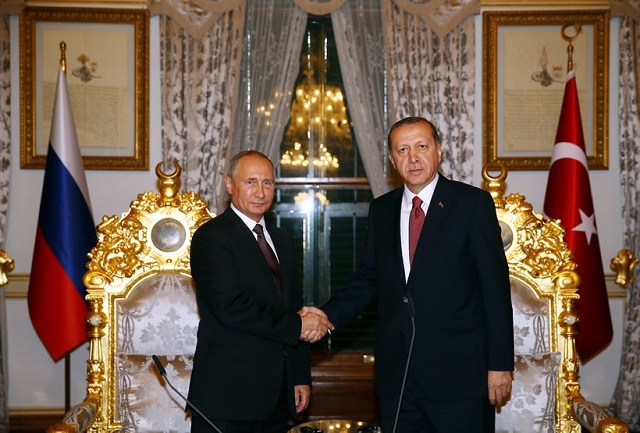
Istanbul, Turkey | AFP |
It had seemed impossible to find insults more scathing.
Russian President Vladimir Putin accused Turkish counterpart Recep Tayyip Erdogan of trading oil with Islamic State jihadists and making modern Turkey’s founder Ataturk “roll in his grave”.
In a loud slanging match between two masters of political machismo, Erdogan in turn condemned Putin for “war crimes” in Syria.
But a year after the start of the worst Turkey-Russia crisis sparked by the November 2015 shooting down of a Russian warplane by Turkish forces, Erdogan and Putin have this year resumed an increasingly tight relationship that has ruffled the West.
There is talk of a new era, agreements by Russia to build a gas pipeline under the Black Sea and a nuclear power station in Turkey, along with growing cooperation on the Syria conflict.
The year has seen the two post-imperial leaders — both men in their early 60s who took over countries in the early 2000s that had come close to economic collapse — defy Europe and the United States but also face mounting economic problems at home.
‘Danger zone’
Putin has over the last few years — especially after Russia’s 2014 annexation of Crimea from Ukraine — become accustomed to receiving the cold shoulder from the West and being excluded from the G8 club of top nations.
With Russia’s military intervention in Syria and an increasingly aggressive crackdown on civil society at home that distance has only increased in 2016.
Erdogan, by contrast, was during the first years of his rule as premier from 2003 garlanded by Europe as a new kind of Islamic reformer who pressed for daring reforms and was committed to the NATO member’s Western orientation.
Yet the last year has marked a possible turning point, not just in Turkey’s relations with the West, but its modern history.
“For the West, Turkey has entered a danger zone with multiple risks,” said Marc Pierini, visiting scholar at Carnegie Europe.
‘Better than ever’
The coup bid in July by renegade elements in the military to unseat Erdogan upended politics inside Turkey and its relations with the outside.
Ankara was stung by a perceived lack of solidarity from EU leaders after a year that has seen hundreds killed in terror attacks and then piqued by European criticism of the merciless post-coup crackdown.
Turkey’s bid to join the bloc — a cornerstone of its foreign policy strategy since the 1960s — has hit the buffers with some analysts suggesting it would be more realistic to abandon it all together and find a different form of partnership.
But not so with Putin’s Russia.
Putin was one of the very first world leaders to support Erdogan after the coup and had none of the EU’s scruples about the magnitude of the crackdown.
While Russia helps Assad’s campaign to retake the whole of Aleppo, not a murmur of complaint is heard from Ankara which backs the anti-regime rebels.
“We understand each other now (on Syria) better than ever,” Prime Minister Binali Yildirm said after visiting Moscow this month.
Another joker in the pack comes from the election of Donald Trump as US president, an event cautiously welcomed by both Moscow and Ankara as possibly ushering in a new American foreign policy.
“It is not in Europe’s interest for Turkey to switch to the Russian axis, to become unstable, or to enter an economic crisis,” warned Asli Aydintasbas of the European Council on Foreign Relations.
‘Prisoners of territory’
The two men came to power at an opportune time to find a place in history.
Putin took over a nation traumatised by the collapse of the Soviet Union and yearning to see Moscow respected as a great power.
Many in Erdogan’s Turkey still hankered after the time when the Ottoman Sultan was the caliph of the whole Islamic world.
The Russian strongman, who famously described the collapse of the USSR as the greatest geopolitical tragedy of the 20th century, has shown no compromise in restoring Russian influence in its near neighbourhood and reminding the world of Moscow’s “great power” status in Syria.
Erdogan meanwhile has made clear Turkey’s clout should go well beyond its post-Ottoman borders, even questioning the post World War I treaty that largely set its current frontiers.
“It’s a century since we were separated from this territory… We will not be prisoners of 780,000 square kilometres,” he said.
Both men — who could stay in power well into the next decade if they win second terms — retain immense popularity at home.
Erdogan’s status has only been boosted after the coup attempt and the president is eyeing stronger powers in a new constitution.
But their popularity was built not just on giving new confidence to relatively young nations who faltered after the collapse of empires but also putting more lira and rubles into voters’ pockets.
Yet Putin’s economic miracle ground to a halt and the defiantly strong growth that has been the mark of the entire Erdogan era is faltering.
According to the IMF, growth in Russia will not exceed 1.5 percent in the next half decade. In Turkey meanwhile, the economy in the third quarter contracted 1.8 percent, the first negative growth in 27 quarters since 2009.
“We continue to see Turkey as facing a banking or growth crisis in the medium term,” said Charles Robertson, global chief economist of Renaissance Capital.
 The Independent Uganda: You get the Truth we Pay the Price
The Independent Uganda: You get the Truth we Pay the Price





